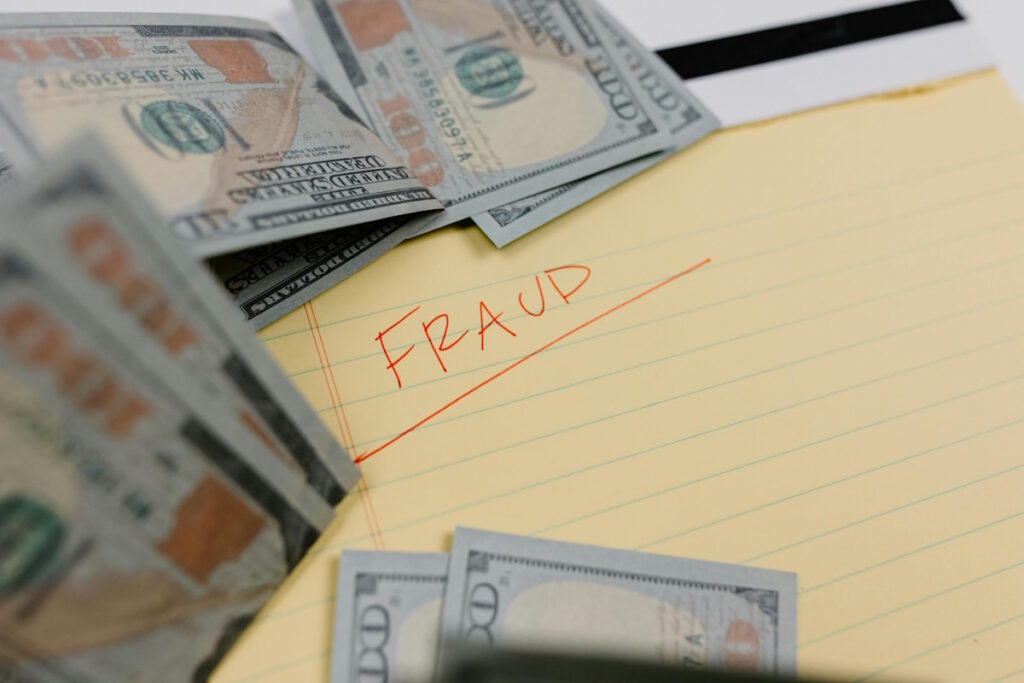IRS Scam: How to Recognize and Avoid Tax Fraud
Worried about tax fraud? Learn how modern IRS scams work, key red flags to spot, and simple steps to protect your refund and identity.
Table of Contents
Tax fraud isn’t new, but the way scammers operate today feels different. A Harris Poll for Alloy found that about 65% of Americans worry about fraud when filing taxes, and nearly a third say the concern is serious for them. To ease some of that stress, you can also lean on a trusted CPA to guide you through filing, as we outline in How Evans Sternau CPA Can Make Your Tax Season Trouble-Free.
This heightened anxiety underscores a critical question for every taxpayer: What is tax fraud in the modern landscape? For starters, it’s no longer just about fudged numbers. Today’s schemes are sophisticated cons designed to steal your refund, your identity, and your financial peace of mind. Recognizing the red flags is your first and most powerful line of defense.
Key Takeaways
- Fraud Has Evolved into Identity. Theft Tax fraud is no longer just about individuals fudging numbers to pay less. Modern scams are sophisticated “cons” focused on stealing your identity and your refund. The goal is to exploit fear and confusion rather than manipulate the tax code.
- It Is a “Numbers Game,” Not a Targeted. Attack Scammers use mass-blasting techniques (thousands of emails or auto-dials) hoping for just a few victims to panic. This means no one is “too rich” or “too careful” to be targeted—scammers are simply looking for a momentary lapse in judgment.
- Recognize the “Tax Relief” Red Flags. Be highly skeptical of unsolicited offers to settle tax debt. Major warning signs include demands for upfront fees, high-pressure tactics claiming offers “expire today,” and guarantees of a specific outcome. Legitimate professionals discuss options, not miracles.
- The IRS Uses Mail, Not Intimidation. The IRS will rarely, if ever, initiate contact via phone, text, or email. They never demand immediate payment via gift cards or wire transfers, and they do not threaten immediate arrest. If the communication feels urgent and aggressive, it is likely a scam.
- Life Events create Vulnerability. Major life changes—such as a job loss or a move—often lead to disorganized or delayed paperwork. Scammers exploit this window to file a fraudulent return in your name before you have organized your documents.
- Verify Your Tax Preparer. Ensure your tax professional is legitimate by demanding their PTIN (Preparer Tax Identification Number) upfront. Additionally, never email sensitive documents like Social Security numbers; insist on using a secure client portal.
- Immediate Action is Required for Suspected Fraud. If you suspect you are being targeted, stop all communication immediately and do not pay. Your next steps should be to contact the IRS directly, report the scam to the FTC and TIGTA, and place a fraud alert on your credit reports.
Understanding the IRS Scam Landscape
Scammers aren’t masterminds. They’re opportunists. To beat their playbook, you must understand how a typical IRS scam works, what counts as tax fraud, and why anyone can end up in a scammer’s sights.
What is Tax Fraud?
Tax fraud happens when someone intentionally gives false information to the IRS to gain money or avoid paying what is owed. Scammers take this concept further by exploiting the complexity of tax laws, making fraudulent claims for credits you never earned, using fabricated documents. They’re not tax geniuses; they’re con artists who understand fear and greed better than they understand the tax code. Recent IRS crackdowns have focused heavily on these types of improper claims, particularly involving the Employee Retention Credit.
Not sure if that “IRS” call or email is real?
Why an IRS Scam Can Target You
No taxpayer is too rich or too careful to be a target. A sophisticated IRS scam is a numbers game. They blast out ten thousand phishing emails; they only need ten people to click. They auto-dial five thousand numbers; they only need five people to panic. In other words, scammers don’t care if you’re a CEO or a retiree; they just need one moment of confusion or pressure to make their play. Your identity and your refund are the only currencies they care about.
Common Tax Relief Scam Tactics
Nothing sharpens a scammer’s focus like a taxpayer worried about a large bill. That anxiety is their favorite weapon, and they wield it with promises of painless solutions. Knowing how these cons operate is what keeps you from becoming their next mark.
What to Look For in a Tax Relief Scam
If someone promises you the moon before they’ve even looked at your case, run. The classic tax relief scam starts with a hefty upfront fee for services they’ll never deliver. They’ll pressure you to act “right now” because their offer “expires today.”
A real pro won’t guarantee an outcome because the IRS doesn’t work that way. They’ll talk about options, not miracles. If it feels like a timeshare presentation for your tax debt, it’s a scam.
Other Frequent IRS Scam Varieties
Unfortunately, it doesn’t stop at tax relief solicitations. Your phone will ring with someone screaming about a warrant for your arrest unless you wire money or, believe it or not, pay them in gift cards. Then there are the fake charities that pop up after a hurricane, the shady “Dirty Dozen” tax shelters peddled online, and the texts about a refund that just needs “verification.”
The bottom line is that the urgency, fear, and demand for payment or information through channels the real IRS would never use is a full-court press of nonsense. Don’t fall for it.
One way to sidestep these “too good to be true” pitches is to work directly with a firm that offers transparent tax advisory and preparation services
instead of unvetted third-party “relief” outfits.
How to Protect Yourself from Tax Fraud & Scams
Scammers often craft convincing stories, sometimes even pretending to be your tax preparer. Knowing the basics of what to watch for and how to respond can save you time, money, and a lot of headaches.
Practical Steps to Verify Legitimate Contacts
The real IRS only talks to you through the mail. If you get a letter, don’t trust the phone number on it. Go directly to IRS.gov yourself and check your online account. That’s your source of truth. When you hire a preparer, demand their PTIN upfront. No PTIN, no business. Never, ever email your Social Security number or tax documents. Use a secure client portal. If someone calls demanding iTunes gift cards, you’re not talking to the government. You’re facing a criminal. Hang up.
Knowing the right questions to ask a potential tax preparer can help you verify their legitimacy immediately.
What to Do If You Suspect a Tax Relief Scam
If you think someone might be luring you into a tax relief scam, stop talking to them immediately. Do not send another dollar. Your first call should be to the IRS to lock things down. Then, report the scammers to the FTC and the Treasury Inspector General for Tax Administration. Slam the brakes on your credit by placing a fraud alert with all three bureaus. If you’ve uncovered a large-scale operation, look into the IRS whistleblower program. You can report the fraud and might even get a reward for your trouble.
And if the person involved is a paid preparer, our guide on what to do if your tax preparer made a mistake walks through how to correct the return and when to report professional misconduct.
Why Understanding Your Tax Position Matters
Think of your tax profile as a financial fingerprint. Specific details within it can, unfortunately, make you stand out to scammers. Knowing what makes you potentially vulnerable is just as important as knowing the scams themselves.

1. Linking Life Events & Tax Vulnerability
A sudden job loss or a big move often delays those crucial tax documents. That delay is a golden opportunity for a criminal to file a return in your name before you even get organized. By understanding your current tax position and expected liabilities, you’re better equipped to detect warning signs of what is tax fraud or a tax relief scam before they become costly problems.
Staying ahead of the game with a preparation checklist can prevent the chaotic delays that scammers exploit.
2. Take‑away Prevention Strategies for Year‑Round Safety
Your security needs to be a habit, not a seasonal scramble. Make a point of glancing over your bank and credit card statements each month. Any strange, small transaction could be a tester. Maintaining clean, regularly reconciled financial statements makes it much easier to spot these anomalies early. When you hire a tax pro, don’t just hand over your life. Ask about their security practices and how they’ll protect your data. Consistent vigilance is your best and most reliable shield.
Conclusion
Protecting yourself from an IRS scam or other types of tax fraud is about embracing a little bit of healthy doubt. Verify, don’t just trust. Stick to official communication channels. Making these simple habits part of your financial routine does more than guard a single refund; it defends your entire identity from those looking to exploit it.
FAQ
- Q1: Is there a way to "lock" my tax account so no one else can file in my name?
A: Yes. You can apply for an Identity Protection PIN (IP PIN) through IRS.gov. This is a 6-digit number known only to you and the IRS. If a scammer tries to file a return with your SSN but without this PIN, the electronic return will be automatically rejected.
- Q2: What is a "Ghost Preparer" and why should I avoid them?
A: A "Ghost Preparer" is someone who charges you to prepare your return but refuses to sign it, making it look like you filed it yourself. This is illegal. If they falsify data to boost your refund, you are fully liable for the fraud, and the preparer disappears without a trace.
- Q3: The article mentions "phishing," but does the IRS ever text taxpayers?
A: Generally, no. The IRS does not send text messages (SMS) asking for personal or financial information, nor do they text about refunds or penalties. If you receive a text claiming to be the IRS with a link to "verify" your profile, it is 100% a scam.
- Q4: Why do scammers specifically ask for gift cards or cryptocurrency?
A: These payments are virtually untraceable and irreversible. The IRS allows payment via bank account, credit card, or check to the "United States Treasury." If a caller insists on iTunes, Google Play cards, or Bitcoin to "cancel a warrant," you are speaking to a criminal.
- Q5: How can I tell if a "Tax Relief" offer is legitimate or a scam?
A: Legitimate tax professionals (CPAs, Enrolled Agents) will analyze your specific financial situation before quoting a fee or result. Scammers use a "one-size-fits-all" approach, demanding an upfront fee and guaranteeing the "Fresh Start" program without knowing if you actually qualify.
- Q6: What exactly happens if I click a link in a phishing email?
A: Clicking often downloads malware (keystroke loggers) onto your device that steals passwords and bank logins. Alternatively, it leads to a spoofed website that looks identical to the IRS portal, designed to trick you into voluntarily entering your Social Security Number and data.
- Q7: I suspect my identity was stolen. Which form do I file?
A: If your e-filed return is rejected because a duplicate exists, file IRS Form 14039 (Identity Theft Affidavit). This alerts the IRS that your SSN has been compromised. You should also continue to pay your taxes and file a paper return while the investigation is pending.
- Q8: Can AI be used to make tax scams more dangerous?
A: Yes. Scammers now use AI to write phishing emails with perfect grammar (unlike older, typo-filled scams) and even use voice-cloning technology to mimic family members or officials on the phone. This makes "gut checks" harder; always verify via a separate, official channel.

